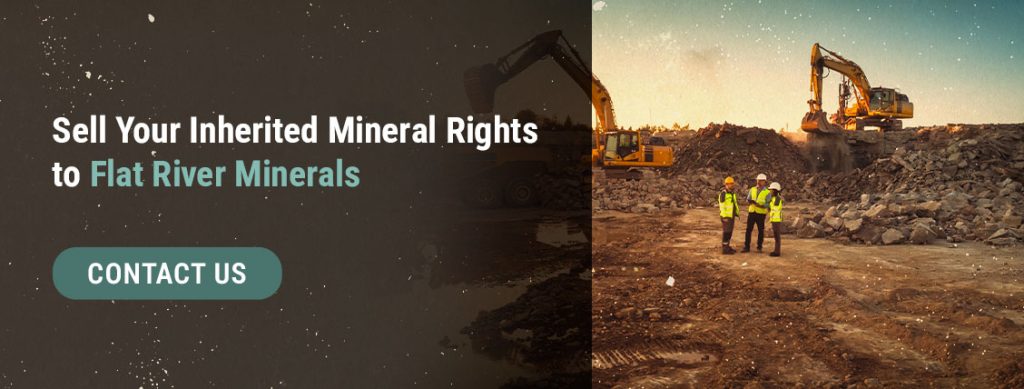
If your family member owns mineral rights, they may transfer these valuable assets to you through a deed during their lifetime or when they pass away. This generational inheritance can involve legal and logistical challenges. This guide explores how mineral rights get passed down and what you can do with your family legacy.
What Are Inherited Mineral Rights?
Mineral rights permit you to extract minerals from a particular piece of land. The owner can explore and drill this area for underground resources like oil, natural gas, iron, silver, gold, copper and uranium. They may then sell these minerals without government authorization.
Inheriting mineral rights from someone else means ownership transfers to you. Mineral rights are different from surface rights, which allow the owner to sell and improve features on the surface of a tract of land.
How Are Mineral Rights Inherited?
A loved one may transfer you their mineral rights while they’re still alive, or they may bequeath them as part of an inheritance when they pass away. People often specify this preference in their wills, while other times, they may wish to make the estate planning process easier and transfer their rights during their lifetime. Here are three ways mineral rights get passed down.
1. Probate With or Without a Will
In some cases, a mineral rights owner may decide in advance who they would like to inherit their mineral rights after they pass. This owner will typically name the beneficiary in their will to ensure legal ownership transfers seamlessly to them.
If a will is not present, the mineral rights will undergo intestate succession. In the event that the decedent dies in the same place as the minerals, the minerals will undergo a normal probate procedure. However, if the decedent dies in another state as the minerals, they will enter an ancillary probate process.
2. Trust
In a trust agreement, the owner of the mineral rights will place them in a trust and specify what the management and distribution process will look like after their death. Before their death, the owner will choose a trustee who will follow the predetermined instructions.
3. Transfer by Deed
Some mineral rights owners wish to avoid the probate process or want to streamline estate planning, so they may transfer their mineral rights through a deed while they are still alive. The owner will typically execute the deed and update ownership records before their death to prevent any disputes.
What To Do With Inherited Mineral Rights

If your mineral rights are prospective for development, you have two options:
Lease Them
By leasing your mineral rights to a company (a “Lessee”), you grant them the right to explore, drill, and extract resources from your land for a set period. In this arrangement, you’ll typically receive an upfront signing bonus for a predetermined “primary term,” usually 3-5 years. If the Lessee does not drill within the primary term, the lease will expire. If the Lessee does drill a well before the end of the primary term, you will receive your proportionate share of the revenues made on the hydrocarbons produced and sold.
It is important to note that your minerals may never be drilled during the primary term of a lease and that you are not assured of being drilled on. Once a well is online, you will receive monthly revenue disbursements on production volumes that will typically peak 1-3 months after a new well is brought online. After that, they will decline month over month but should provide revenue over 10+ years.
Sell Them
You may prefer to sell your mineral rights if you want to realize their value upfront and remove the uncertainty around drill timing and future commodity prices. In this scenario, a company may offer you a cash payment upfront for your mineral rights. Such an offer is typically based on (i) production and royalties from any existing wells, (ii) predicted future development of additional wells, if any, and (iii) predicted commodity pricing of the life of any well(s).
This process involves four simple steps:
- Provide proof of your mineral ownership containing a legal description of the minerals
- Receive a purchase offer based on the information you’ve provided
- Undergo a due diligence period to confirm ownership in the stated mineral interest
- Receive an updated purchase price depending on whether due diligence determines you have more or less than initially believed
Benefits of Selling Inherited Mineral Rights
Here are some worthwhile benefits of selling your inherited mineral rights.
- Financial Certainty and Immediate Liquidity: Selling your oil and gas mineral rights provides a lump sum payment upfront, representing the present value of expected future cash flows. This immediate financial gain can be significant, especially if you have immediate needs or plans such as paying off debts, funding a college education, or securing your retirement. The oil and gas market can be highly volatile, and future revenues are uncertain due to fluctuating commodity prices and production levels. Selling your rights can mitigate these risks by providing guaranteed cash today, rather than uncertain returns in the future.
- Diversification of Investments: Holding on to mineral rights means your investment is concentrated in a single, often volatile market. By selling your mineral rights, you can use the proceeds to reinvest in more stable, predictable assets such as real estate or diversified retirement funds. Utilizing a 1031 exchange, for instance, allows you to reinvest the proceeds from the sale into a like-kind property, enhancing your ability to grow your investment portfolio more securely and with potential tax advantages such as deferring certain tax types like capital gain taxes.
- Estate Planning and Simplification: Managing oil and gas mineral rights can be complex, involving lease negotiations, monitoring of production activities, and management of royalty income. This can become particularly cumbersome as part of an estate. Selling these rights simplifies your estate, making it easier to manage and less burdensome for heirs to inherit. It reduces the need for your heirs to understand the intricacies of the oil and gas industry and deal with ongoing legal and financial responsibilities associated with mineral rights.
Ensure the company you are receiving an offer from has technical experts who can evaluate the land accurately and effectively.
FAQs About Mineral Rights Inheritance
Do you still have questions? Here are some frequently asked questions about mineral rights inheritance.
How Do I Know if I Inherited Mineral Rights?
You can discover if you inherited mineral rights by checking family records and deeds or your local tax, foreclosure and loan records.
What Happens to Oil Royalties When Someone Dies?
When someone who receives oil royalties passes away, they can specify whether they want the payments to continue going to designated beneficiaries. If the deceased person had a will or trust, their heirs will receive the royalties as set forth in their will after the estate has been admitted to probate. If someone passes away intestate (without a will), the state’s intestate succession laws dictate who gets the royalties. In either instance, in the absence of a trust, the estate must be admitted to probate in the state(s) where minerals are owned to transfer legal ownership. If a trust is in place, the minerals will pass to the beneficiary as laid out in the trust documents, therefore bypassing the probate proceedings.
How Are Inherited Mineral Rights Valued?
You must have the land and its resources reevaluated when you inherit mineral rights, which also becomes your cost basis when calculating the potential tax implications of a sale. A company should value your inherited mineral rights by assessing both existing production (if any) as well as any potential future development.
Sell Your Inherited Mineral Rights to Flat River Minerals

If you’ve recently inherited mineral rights, you might prefer the simplicity and immediacy of cash for any of the reasons mentioned earlier, among others. Flat River Minerals is a mineral and royalty acquisition company with a diverse portfolio, equipped to purchase your inherited mineral rights for cash.
For owners of mineral rights in Ohio, Pennsylvania or West Virginia, our subsidiary, Cloud Peak, leverages technical expertise to accurately value your minerals and ensure you receive the best cash offer. If your mineral rights are in Wyoming, another one of our specialized subsidiaries, Rocking WW, provides fair offers based on precise engineering and geological analysis.
No matter your location, our team of experts delivers organized, reliable service, providing thorough evaluations and detailed projections. Get a free evaluation with us today and begin achieving your financial objectives.
